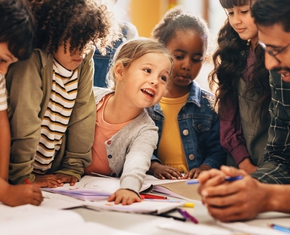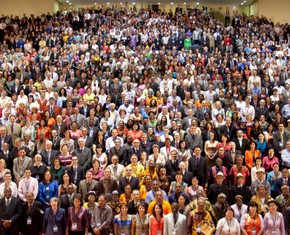The views expressed in our content reflect individual perspectives and do not represent the authoritative views of the Baha'i Faith.
As our global culture becomes more focused on the material aspects of life, we can easily forget our spirituality, and our relationships with each other suffer as a result.
After all, love and friendship—the intangible but extremely important pillars that really hold a community together—have always been spiritual in nature. A decrease in the importance given to spirituality naturally manifests itself as societal problems.
As a response to this widespread social problem, interfaith prayer gatherings that welcome everyone in a community have become more and more widespread. Through these devotionals, neighbors come to see each other as friends, and themselves as spiritual beings. When these local gatherings proliferate, profound change can begin to take place in a community.
The Baha’i teachings say that the influence of such an activity can be extremely powerful:
If a small number of people gather lovingly together, with absolute purity and sanctity, with their hearts free of the world, experiencing the emotions of the Kingdom and the powerful magnetic forces of the Divine, and being at one in their happy fellowship, that gathering will exert its influence over all the earth. The nature of that band of people, the words they speak, the deeds they do, will unleash the bestowals of Heaven, and provide a foretaste of eternal bliss. – Abdu’l-Baha, Selections from the Writings of Abdu’l-Baha, p. 81.
Prayer gatherings build unity among the people in communities, and create a strong sense of resolve in everyone to work together for the betterment of the world, starting from their immediate surroundings.
It takes effort, of course. Like any habit, regularity and understanding must develop, and those participating must come to understand the importance of the activity in order to keep it thriving. In many cultures, even the idea of praying feels foreign—and so interfaith devotionals often incorporate music and reading, studies and conversation to begin to explore what prayer means, why it is important, and what role it can play in unifying society.
These kinds of spiritual gatherings have a much more powerful effect than groups of friends might even notice at first. In building a strong spiritual relationship with their neighbors, participants simultaneously protect their communities from dangerous influences such as prejudice and suspicion—influences that can often culminate in feelings of alienation, distrust and even hatred in a neighborhood. In subtle but powerful ways, prayer protects a community and makes it stronger, enabling it to face the challenges that the entire world faces together, committed to solving problems while remaining true to each other.
For example: in the aftermath of political decisions that had direct, negative consequences on a community of immigrants in Texas, friends noticed that the morale of the neighborhood had markedly fallen. Parents and children alike felt terrified for their future. Identifying a need for spiritual relief from nearly overwhelming tension, neighborhood friends organized an impromptu prayer gathering. Families, adults and children attended wholeheartedly, praying enthusiastically regardless of age. After the devotional, a renewed sense of hope and unity grew in the neighborhood—in stark contrast to the fear and uncertainty that had ruled before. Neighbors had renewed confidence that they could count on each other, and increased certainty that God had not abandoned them.
In neighborhoods where Baha’i community building activities—such as children’s classes or junior youth groups—take place, devotionals help create a spirit of unity and open communication, providing a method to overcome any disagreements and raise morale in the face of challenges. More practically, prayer gatherings provide a place where everyone is welcome to share their beliefs and opinions, making it an ideal environment for children, junior youth, parents and adults to gather together.
Over time, these kinds of interfaith devotionals become an irreplaceable part of a neighborhood’s social and spiritual life. While some of these interfaith prayer gatherings happen weekly, or monthly, in many parts of the world they have become a daily activity that brings together a neighborhood before going to work, or every evening after work. In this way, neighbors live much more involved and connected lives. Instead of locking themselves away in their homes every day, they develop relationships that take place in a spiritual space, setting a tone of reflection and compassion for their every interaction.
The Universal House of Justice, the international administrative body of the Baha’i Faith, offered its insight on what begins to take place when a community nurtures this spirit of devotion:
Prevailing habits, customs, and modes of expression all become susceptible to change—outward manifestations of an even more profound inner transformation, affecting many souls. The ties that bind them together grow more affectionate. Qualities of mutual support, reciprocity, and service to one another begin to stand out as features of an emerging, vibrant culture among those involved in activities. – The Universal House of Justice, 29 December 2015.
In the places where prayer gatherings have brought friends and neighbors together and begun to exert a spiritual influence upon their relationships with each other, we’re only beginning to see glimpses of the picture the Universal House of Justice paints. But these glimpses are extremely hopeful; and as more and more people around the world bravely decide to open spaces for prayer, the world is beginning to feel the effect prayer has on the very life of a community.
















Comments
Sign in or create an account
Continue with Googleor